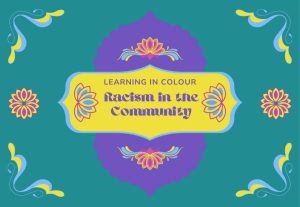10 Instances of Racism in the Community

Students of colour experience discrimination and racism within and outside of the classroom. Regardless of context and situation, these experiences have cyclical and adverse effects.
CONTENT WARNING: Depending on your lived experiences and identities, some of the content on this site may be troubling, uncomfortable, challenging, and, at times, triggering. Engage mindfully and intentionally when embarking on your exploration of Learning in Colour, and connect with resources for students if needed.
As mentioned previously, students of colour experience discrimination and racism within and outside of the classroom.
Regardless of context and situation, experiences of discrimination and racism have cyclical and significant effects on the lives of students of colour, meaning that instances of racism in the classroom can affect day-to-day life outside of campus and vice versa. As mentioned in earlier sections, racism can happen acutely or chronically and has subjective and unique effects on racialized persons. This section is to arm you with some tips for addressing and navigating discrimination and racism in the broader Hamilton community.
How to Address It
If it is not safe to collect this type of information, disengage and, when in a safer space, attempt to recollect and document the date, time of occurrence, location, experience, language used, violence experienced, descriptions of perpetrators, etc. This can assist with case building. However, the unfortunate reality for a lot of folks is that, without “concrete evidence,” the police and the law often cannot intervene. Conversely, you may not want to pursue legal action or police involvement, which is an absolutely normal response. In these cases, finding a therapeutic service or support group to unpack what has happened should be a primary goal.
Addressing encounters of racism and discrimination can be scary, especially when you are alone without witnesses or supports. A key suggestion is to disengage from the perpetrator. Often, those who inflict racial violence progressively become escalated, defamatory, labile, and, at times, violent. Quickly and safely removing yourself from the situation should be held paramount at all times, especially if you are alone.
If you have witnesses nearby or you are with a friend: before disengaging and if wanting to pursue things legally, attempt to non-invasively obtain identifying information (i.e. the perpetrator’s name, evidence of their face, or license plates, record witness statements, or video record). This can assist in navigating police involvement as the criminal system of reporting hate crimes often goes sour or is dismissed without “concrete evidence.”
An additional safeguard is consulting legal aid; a free over-the-phone “pro bono” service that can consult with you about what happened and arm you with advice, strategies, terminology, and, if deemed necessary, legal representation to handle the hate crime you may be reporting. A link to legal aid can be found here.
Navigating Police Involvement
Navigating police involvement can be uncomfortable as police have often been a fixture of discrimination, racism, violence, and profiling in communities of colour. However, if armed with concrete evidence, clear timelines, legal advice, and the capacity to work with police, the likelihood of hate crime reporting being successfully resolved can increase.
- Gather as much detail as you can: photo evidence, video recordings, names, license plates, witnesses, date, time, location, whether or not employees or recordings from stores are accessible, etc.
- Obtain legal consult or representation throughout the reporting process
- Consult with the victim services unit; they can assist in directing you to the appropriate legal departments, advising on reporting and disclosing, and supplying a support person if you choose to report to the police in a formalized way, such as through the victim impact statement. They do have a website dedicated to hate-motivated crimes to explore that navigates when, how to report, and other useful information: https://hamiltonpolice.on.ca/victim-services/hate-motivated-crime
- You can report during the incident by calling 911. After a hate crime has occurred, you can report by calling HPS 905 546 4925 and specifically stating that you would like to report “a hate crime under the motive of race and ethnicity.” Conversely, you can report online through https://www.coplogic.ca/dors/en/filing/showprefilingquestion?dynparam=1628523128731
- Keep your investigator/officer accountable; when someone does reach out to obtain further details of your case, ask for their department, badge number, name, and direct extension for follow-up. Keep in mind that this process could take months
- Inform your support circle and information share with the HCCI contacts (more information in HCCI Hate crime reporting system section)
HCCI’s Hate Crime Reporting System
The Hamilton Centre for Civic Inclusion has been an instrumental resource for people of colour in Hamilton. HCCI has an independent, user-friendly, community-based online hate reporting platform that is geared toward tackling hate on an individual and societal level through research-based initiatives. While they are not able to directly make legal reports on your behalf, they do provide a reporting platform that allows the Hamilton community to give an informed and enhanced picture of the climate of hate in Hamilton. Check it out at this link.HCCI is also a great tool and resource for Black Youth Mentorship, equity, diversity, and inclusion training, political education, and a site for strategizing, mobilizing, and addressing hate crimes and racism at the community level. We encourage you to explore their website.
Resources for Counselling/Support
Some resources useful on campus that can assist in individual or collective therapy and counselling are:
- The Student Wellness Centre: an experienced therapist can sit down and consult with you after a consultation appointment. If you had a therapist in the community, they can also pick up where you left off! Find information here
- SOCH Mental Health McMaster
- Jack.org McMaster
- Cope: A student Mental Health Initiative
- Indigenous Student Services
- The Black Student Success Centre
Some website resources for low cost or scaling-cost community therapy that is racially and ethnically reflective, focusing on instances of racism and discrimination:
- Psychology Today – Racial Identity Therapists
- Psychology Today – Black Therapists
- Open Counselling Hotlines
- Black Therapist Directory
